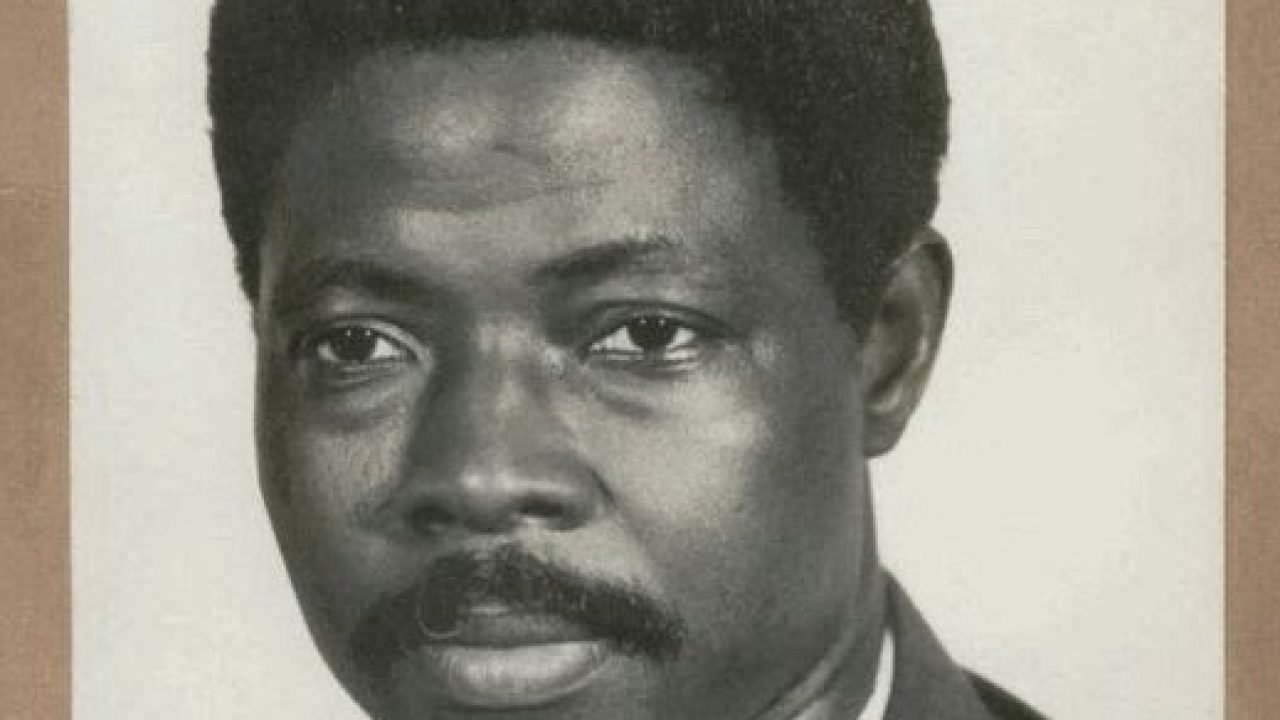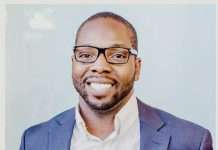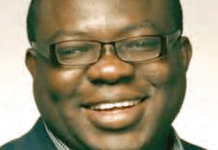Among the notable structures that festoon the landscape of the University of Ibadan is the E. Latunde Odeku Medical Library. Anyone familiar with the university environment would easily attest that this library is the largest in the premier citadel of learning. Whether this is a mere coincidence or not, it must be said that the man after which the imposing edifice is named deserves no less a monument, considering his monumental place in the history of the medical profession in Nigeria and Africa as a whole.
Indeed, if the walls of the impressive library could speak, they might even suggest that his name, currently inscribed in befitting royal blue, be emblazoned in sparkly gold. And they would be justified – for, long before the emergence of such celebrated names as Benjamin (Ben) Carson in the field of neurosurgery, there had been a Nigerian-born Professor Emmanuel Olatunde Alaba Odeku, who dared the impossible, achieved the incredible and gave the best of himself to advance neurosurgical practice and training in Africa. He was, in fact, the first African-American neurosurgeon to qualify in the United States.
Ben Carson himself once wrote of Odeku: “I remember seeing a portrait of Dr Odeku hanging on the wall in the neurosurgery department at the University of Michigan when I was a medical student there. It was clear that he had been greatly admired. He had died just the year before I did my first neurosurgery rotation as a third year student. Perhaps even greater than his surgical and intellectual talents was his humanity. He bypassed a comfortable living in the United States to bring state-of-the-art medicine and enormous self-esteem to countless people in Nigeria and throughout the African continent. I think we can all be very proud to have such a man as a member of our profession.”
Making of a legend
Odeku is reputed as Africa’s first neurosurgeon and the first indigenous physician to practise this extreme complex aspect of Medicine on the continent. However, as Ben Carson rightly noted above, what makes his story more striking and inspiring is the depth of passion and compassion which he put into his work. Proofs of this began to emerge shortly after his qualification as a neurosurgeon in the United States of America, where he was offered multiple appointments including two distinguished academic neurosurgery faculty positions that should have made him very comfortable with their lucrative salaries. However, he turned them all down and chose to return to Nigeria to serve his countrymen. As will be seen shortly, this decision came at great personal costs, but his passion to bring the best of neurological care to the people of his home country superseded every other consideration.
Coming back to Nigeria with such a blazing passion, it is no surprise that the brief years he spent labouring were filled with an array of unprecedented achievements. A biographer actually noted that just within a few years of his arrival, he had demonstrated so much competence and diligence (especially with his patients) that he “attained the status of a legend within the medical community.”
Odeku masterminded the starting of the Neurosurgical Unit in the Surgery Department of the College of Medicine, University of Ibadan. He was equally instrumental in the founding of the National Postgraduate Medical College of Nigeria (NPMCN) and the West African Postgraduate Medical College (WAPMC). Also attributed to him is the introduction of the swearing-in ceremony and commencement address at the University of Ibadan College of Medicine, two traditions presently performed in all Nigerian medical schools.
Summarising Odeku’s years of teaching, practice and writing, the official journal of the Congress of Neurological Surgeons (Neurosurgery), says: “Known as a legendary teacher and clinician, with the ability to quickly ascertain essentials in diagnosis, he inspired and brought hope to many through his selfless provision of neurosurgical care. Not satisfied with his excellence in these areas, he also made a multitude of contributions to the neurosurgical literature, publishing 61 articles in peer-reviewed journals over a 12-year span.”
Background and education
Odeku was born on 29 June 1927 in Lagos. His father, a deacon in the Baptist Church, was a native of Awe, in Oyo State; while his mother was a Lagosian. He attended St. John’s Anglican Primary School, Aroloya, Lagos, before proceeding to Methodist Boys’ High School (MBHS), where he passed the London Matriculation Examination, in 1945. It was MBHS that he shortened his name from Olatunde to “Latunde.”
An exceptionally brilliant scholar, Odeku got an opportunity to emigrate to the United States of America for his undergraduate studies. He enrolled at Howard University, Washington D.C. Majoring in Zoology, he received his Bachelor of Science degree in 1950, graduating summa cum laude as the valedictorian of his class. He won a scholarship that enabled him to proceed to the Howard University College of Medicine. He obtained his M.D. in 1954 as a member of the Kappa Pi Honorary Medical Society, an award granted to the top 10 per cent of Howard University’s medical school students.
Following his graduation, he served his internship at the University Hospital, University of Michigan, Ann Arbor, from 1954 to 55. There, he majored in Pathology, under the late Professor Carl V. Weller, M.D. At the end of his medical internship, he travelled to the University of Western Ontario College of Physicians and Surgeons where he passed the examination for the Licentiate of the Medical Council of Canada.

Further training and exposure
Having always intended to use his training and knowledge for the benefit of the citizens of his home country, Odeku travelled briefly to Nigeria in 1955 to gain first-hand knowledge of the problems of medical practice in the tropics. He served as medical officer at the Lagos General Hospital from August 1955 to June 1956. He returned to the University of Michigan soon after and served for one year as assistant resident in general surgery under the late Professor Frederick A. Coller. Thereafter, he spent three years training in neurosurgery at the University of Michigan Medical Centre, Ann Arbor, under the guidance of Professor Edgar A. Kahn and his associate, Dr. Richard C. Schneider.
After his residency, he spent the next year at Walter Reed Medical Centre in Washington, D.C., training in neuropathology under Dr Webb Haymaker. He spent the following year studying paediatric neurosurgery at the Children’s Hospital of Philadelphia under Dr Eugene Spitz, creator of the famous Spitz-Holter valve for treating hydrocephalus. In 1961, he returned to Howard as a member of the neurosurgery faculty, during which time he was certified by the American Board of Neurological Surgery, passing the examination “with flying colours”.
Heavy price of patriotism
Having gained advanced knowledge and experience in neurosurgery, Odeku began to seriously think of returning to Nigeria, where he felt his services as a pioneer neurosurgeon would be critical. Rejecting very lucrative job offers from different institutions in the United States, he chose to return to Nigeria in 1962, “at great monetary and personal sacrifice.” The monetary aspect of the sacrifice paid by Odeku involved not just the financial cost of his moving down to Nigeria to settle, but the cost of purchasing and bringing with him many expensive neurosurgical instruments, which he knew would not be available in his country.
But the personal sacrifice made by Odeku to fulfil his ambition was even more remarkable. As reports have it, as at the time he made the decision to return to serve his fatherland, Odeku was already married to a foreigner, Dr Mary Gilda Marques (also Howard-trained) and they had two children together. Odeku’s wife was however not willing to come to Nigeria with him and the two were ultimately divorced.
Odeku resumed at the University of Ibadan, soon after his arrival in Nigeria. He conducted his first surgery on 23 October, 1962, his patient being a 12-year-old boy with a brain tumour. According to the Neurosurgery journal, “Dr Odeku’s successful resection of the tumour, which was witnessed by the general surgery chairman, marked the genesis of the neurosurgical unit in Ibadan.”
In 1963, Odeku was promoted to senior lecturer at Ibadan and elected a Fellow of the American College of Surgeons. In 1965, he became a full professor of surgery and was soon made head of the Department of Surgery and later dean of the College of Medicine. Indeed, his years at Ibadan were devoted to tireless service as a practitioner, teacher and reformer. According to the Journal of the National Medical Association (July, 1975), “As a teacher, his presentations were didactic, highly organised and convincingly clear. As a clinician, he had the uncanny ability of quickly getting down to essentials in diagnosis, whether at the busy outpatient clinics or at the formal medical conferences.”
So impressive and widely-acclaimed was Odeku’s reputation as a distinguished practitioner that his former teacher and mentor, Dr Kahn, had to visit the University of Ibadan for several weeks (in 1965) to join him in performing a number of neurosurgical operations and conducting lectures. He also invited him to contribute a chapter to the textbook titled Correlative Neurosurgery.
It is equally worth noting that despite his busy schedule in medical practice, Odeku was a prolific and accomplished poet. He authored two collections of poetry: Twilight: Out of the Night (1964), and Whispers from the Night (1969).
Awards and recognitions
Professor Odeku was a Fellow of the International College of Surgeons, FICS (1966); Fellow of the American College of Surgeons, FACS (1963); Fellow of the College of Surgeons of West Africa; and Fellow of the Medical College of Surgeons, FMCS (Nigeria). He received the Howard University Alumni Medal for Distinguished Service in 1973.
Odeku remarried in 1971 to Dr Jill Katherine Adcock, an English medical doctor who was working at the University College Hospital. They had two children together.
Odeku died of complications of diabetes, on August 20, 1974 at Hammersmith Hospital, London.










